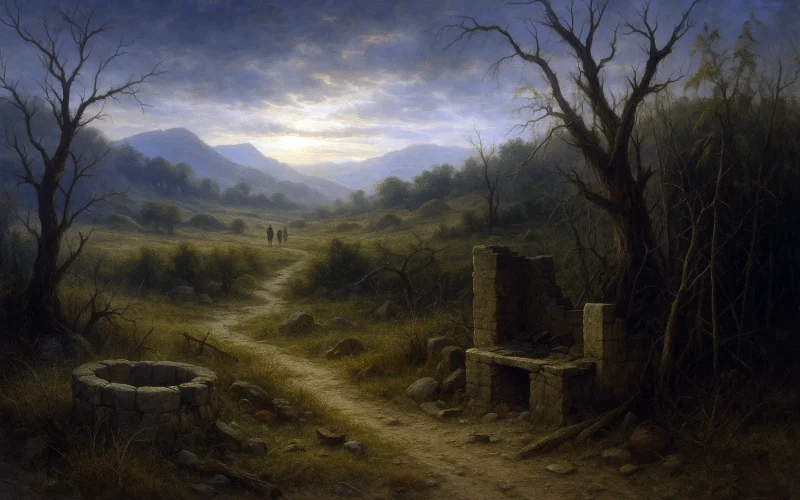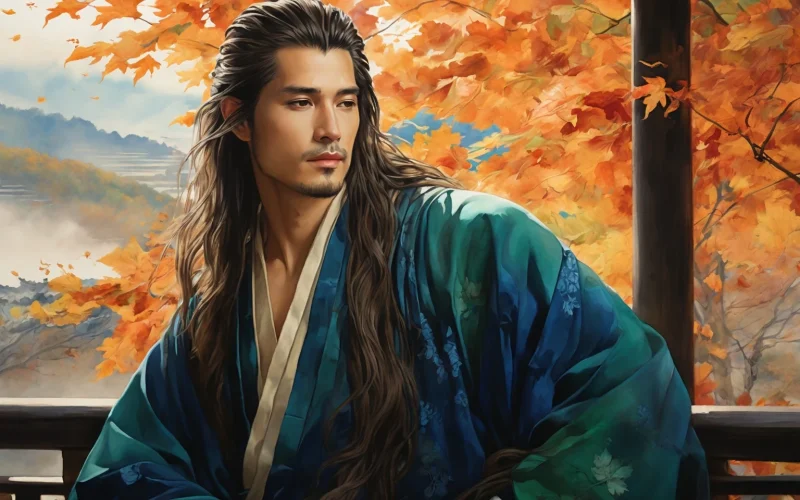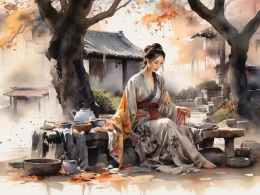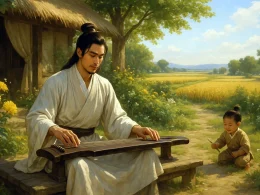Melancholy, I come back, staff in hand,
Going alone the rugged bushy way.
In mountain crooks shallow and clear I stand
And wash my feet where a moment I stay.
At home I strain my newly-ripened wine,
Cook a chicken and with neighbors share it.
My room turns dark when there's no more sunshine,
Branches are burned instead of candle lit.
So joyful we're that we find short the night;
Soon in the east we see the first sunlight.
Original Poem
「归园田居 · 其五」
陶渊明
怅恨独策还,崎岖历榛曲。
山涧清且浅,可以濯吾足。
漉我新熟酒,只鸡招近局。
日入室中暗,荆薪代明烛。
欢来苦夕短,已复至天旭。
Interpretation
Composed around 405 CE, this fifth and concluding poem of Tao Yuanming's "Returning to Dwell in Gardens and Fields" series captures the most unassuming day in pastoral life. From returning from labor to sharing drinks with neighbors, every mundane moment becomes poetic. The work not only portrays the authentic reality of reclusive living but also expresses the poet's profound appreciation for this serene simplicity, culminating in a transcendent perspective that elevates the entire series.
First Couplet: "怅恨独策还,崎岖历榛曲。"
Chàng hèn dú cè huán, qíqū lì zhēn qū.
Melancholic, alone with my staff I return, treading thorn-choked winding paths.
The opening "melancholic" reveals complex emotions—weariness from labor and unspoken reflections on turbulent times. The rugged path mirrors life's difficulties during this historical period.
Second Couplet: "山涧清且浅,可以濯吾足。"
Shān jiàn qīng qiě qiǎn, kěyǐ zhuó wú zú.
Mountain streams run clear and shallow—here I wash my dust-laden feet.
This pause in the journey symbolizes spiritual purification. The simple act of foot-washing becomes a ritual of returning to nature's purity.
Third Couplet: "漉我新熟酒,只鸡招近局。"
Lù wǒ xīn shú jiǔ, zhī jī zhāo jìn jú.
Filtering my newly brewed wine, with one chicken I invite nearby friends.
The poet's humble hospitality—homemade wine and a single fowl—embodies authentic rural generosity and contentment in modest means.
Fourth Couplet: "日入室中暗,荆薪代明烛。"
Rì rù shì zhōng àn, jīng xīn dài míng zhú.
Sunset darkens my cottage—bramble faggots substitute for bright candles.
"Bramble faggots" epitomize resourceful simplicity, transforming material lack into spiritual abundance through mindful acceptance.
Fifth Couplet: "欢来苦夕短,已复至天旭。"
Huān lái kǔ xī duǎn, yǐ fù zhì tiān xù.
Joy makes night seem fleeting—suddenly dawn's light returns.
The bittersweet lament over night's brevity paradoxically celebrates the fullness found in simple pleasures, where temporal measures dissolve in contentment.
Holistic Appreciation
The poem traces a complete diurnal cycle from twilight return to morning's arrival through vivid, unembellished snapshots. Each gesture—foot-washing, neighborly hospitality, makeshift lighting—reveals profound satisfaction in elemental living. The closing dawn symbolizes both daily renewal and the poet's enlightened perspective, where material lack cannot diminish spiritual wealth.
Artistic Merits
This poem primarily employs a "documentary" approach, vividly capturing both the hardships and tranquility of pastoral life. While the language is unadorned and plain, every line is remarkably vivid and expressive. Structurally, it moves from activity to stillness, from homecoming to inebriation, and finally to the break of dawn, completing a full day's cycle that also symbolizes the poet's spiritual journey from officialdom to reclusion, from worldly dust to purity. The poet excels at discovering profound meaning in the mundane, elevating trivial matters into philosophical meditations on life, achieving a perfect unity between "nature" and "sentiment."
Insights
Tao Yuanming uses the most unassuming language to depict a day's homecoming and social interactions, yet these verses contain profound life attitudes and spiritual pursuits. Unswayed by material desires and uncomplaining about poverty's hardships, he settles his life with a transcendent and free-spirited mindset, finding joy in the genuine connections between people and the purity of nature within pastoral life. It is precisely this serene, composed, and non-contentious attitude that shows us another possibility amidst today's restlessness: simplicity can indeed be a form of fulfillment.
Poem translator
Xu Yuanchong (许渊冲)
About the poet

Tao Yuanming(陶渊明), 365 – 427 CE, was a poet, literary figure, fu writer, and essayist active during the late Eastern Jin and early Liu Song dynasties. Born in Chaisang (near present-day Jiujiang, Jiangxi Province), he pioneered a new genre of pastoral-themed literature, expressing profound philosophical insights through simple language. His poetic style became an enduring aesthetic standard in classical Chinese poetry.











